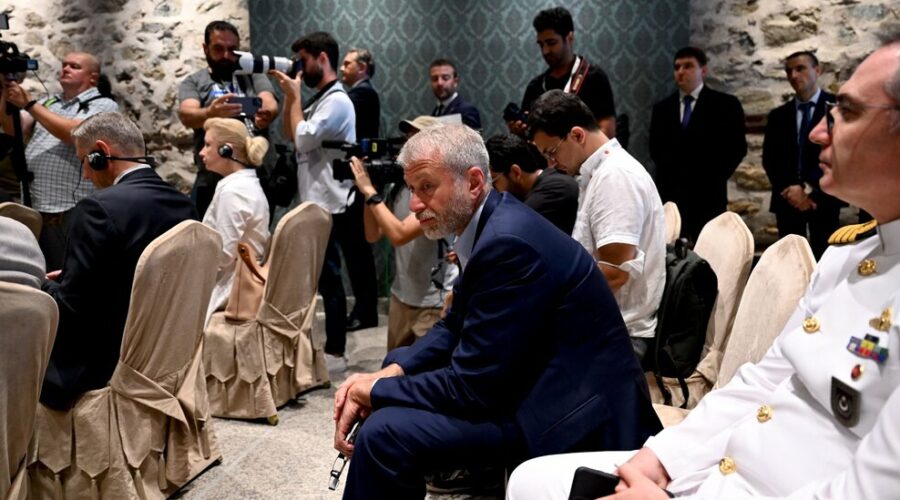Federal Authorities Investigate Firm Linked to Roman Abramovich
The Securities and Exchange Commission and the F.B.I. have been investigating Concord Management, people close to the firm said.
Send any friend a story
As a subscriber, you have 10 gift articles to give each month. Anyone can read what you share.
By Matthew Goldstein and David Enrich
Federal authorities are investigating Concord Management, a small investment advisory firm that oversaw billions of dollars in hedge fund investments for the Russian oligarch Roman Abramovich, according to people close to the firm.
The investigations, by the Securities and Exchange Commission and the Federal Bureau of Investigation, are focused at least in part on how associates of Mr. Abramovich used a series of offshore shell companies to invest up to $8 billion in dozens of U.S. hedge funds and private equity firms over the past two decades, the people said.
The authorities are seeking information about the flow of money to and from more than a dozen shell companies based in havens like the British Virgin Islands and the Isle of Jersey.
The S.E.C. began issuing subpoenas in the investigation of the Tarrytown, N.Y., firm about two months ago. Lawyers in the S.E.C.’s Boston office, which is overseeing the inquiry, have begun interviewing people familiar with Concord’s operations, the people said.
F.B.I. agents based in New York have also conducted interviews in an investigation that is separate from the S.E.C. inquiry, one of the people said.
Both investigations appear to be focused in part on tracing how the money was invested and whether the investments recommended and arranged by Concord may have concealed the Russian oligarch’s involvement. The inquiries are in their early stages, and no charges may arise from them.
Concord was created in 1999, and its business revolved around picking potential hedge fund and private equity investments for offshore entities linked to Mr. Abramovich. The firm is led by its founder, Michael Matlin.
A spokesman for Mr. Matlin said he was not available for comment.
Representatives for the S.E.C. and F.B.I. declined to comment.
The investigations began several weeks after The New York Times first reported on Concord’s role overseeing hedge fund investments for Mr. Abramovich. The scrutiny by federal authorities comes as some in Congress have pushed to close a loophole that has allowed hedge funds and private equity firms, in some instances, to avoid conducting the same kind of anti-money-laundering and know-your-customer checks that banks and mutual funds routinely have to perform.
That loophole drew fresh attention this year after Russia’s invasion of Ukraine and the decision by the British government and the European Union to impose sanctions on Mr. Abramovich. That forced him to sell the famed Chelsea Football Club in London and resulted in authorities freezing more than $13 billion in assets held by banks and financial institutions in Britain, the Cayman Islands, the Isle of Jersey and the British Virgin Islands.
Over the years, dozens of hedge funds and private equity firms have accepted investments from Mr. Abramovich’s offshore entities, including many that were arranged by Concord, according to an internal document prepared by one Wall Street firm. The funds were managed by Millennium Management, BlackRock, Paulson, Carlyle Group and D.E. Shaw, among other firms, according to people briefed on the matter and the document.
But the names of most of the hedge funds to which Concord directed investment dollars remain unknown.
Concord kept a low profile. It does not have a website and has about a dozen employees. It is not registered as an investment adviser with U.S. regulators. Its offices, in a nondescript building off a suburban highway, are behind windowless black metal doors. No one answered when reporters knocked on two recent occasions.
Because of the daisy chain of offshore entities used by associates of Mr. Abramovich to invest his money, it is unclear how many hedge fund and private equity firms realized that Concord was representing his interests. In recent years, though, Concord’s link to Mr. Abramovich has become more widely known on Wall Street, industry officials said.
Mr. Abramovich, who is also a citizen of Israel and Portugal, earned his billions by buying a state-owned Russian oil company for $200 million and then selling it, years later, for nearly $12 billion. He has close ties to President Vladimir V. Putin of Russia. When Mr. Putin was consolidating power some two decades ago, Mr. Abramovich served as a governor of a Russian province.
While the United States has not placed sanctions on Mr. Abramovich, federal prosecutors in June filed court papers seeking to seize a Boeing 787 Dreamliner and a Gulfstream jet that he is said to own. Federal authorities said the planes, together valued at more than $400 million, had been moved to other countries in violation of U.S. export regulations imposed after Russia’s invasion of Ukraine.
The court papers said Mr. Abramovich concealed his ownership of the planes through a series of shell companies in offshore jurisdictions.
Mr. Abramovich hired the law firm Kobre & Kim in July to represent him “in relation to judicial and administrative proceedings” and to lobby the U.S. government, according to a federal filing by the law firm. Kobre & Kim said Mr. Abramovich, in his role as mediator between Russia and Ukraine, “has been heavily involved in advocating for, and coordinating the establishment of humanitarian corridors and other humanitarian rescue missions.”
A spokesman for Kobre & Kim declined to comment.
Site Information Navigation
Source: Read Full Article




